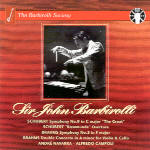It’s important to remember just how “local” the record business was in the 1940s and ’50s. There were no great, international entertainment conglomerates as we now understand them, though various record labels worked together to license titles for release in specific territories. Orchestral tours in the age before jet travel were few and far between; indeed, the very concept of a 52-week season for even the largest ensembles was still a couple of decades away. Europe during the ’50s was rebuilding after the devastation of World War II, and this was as true culturally as economically. Most of the big orchestras had been decimated, losing Jewish and other musicians, and the recordings bear this out. For the most part, even such celebrated ensembles as the philharmonics of Vienna and Berlin sound pretty seedy compared to their American counterparts during this time, though there were some exceptions: the Czech Philharmonic under Ancerl, and London’s Philharmonia under Karajan and Klemperer.
All of these factors are relevant in considering this re-release of pretty much unmemorable material dating from the period 1948-59. It’s understandable that older listeners and British critics either around at the time (and still active presently) or those who perhaps wish they had been (most of the rest?) will harbor a fondness for these recordings independently of what they actually sound like, but unless you’re simply drowning in nostalgia, there’s very little of musical value on offer. Take Schubert’s Ninth. Even if we restrict ourselves to the decade of the ’50s and immediately before, there were first-rate performances available by Mengelberg, Toscanini, Furtwängler, Munch, and Krips, to name only five that come readily to mind. Klemperer and Szell were just over the horizon.
What did Barbirolli and his intrepid band of third-raters bring to this equation? Not much. Intonationally challenged brass (those sleazy trombones!), wretched winds (always a bit behind the beat in the first movement, unforgivably sour in the slow movement’s second subject), scruffy strings (everywhere), and mushy timpani: this was hardly competitive in 1953, and it isn’t now. Nor does Barbirolli offer any insights of note. He beats time, keeps things moving, and does little else that the conductors noted above don’t do better. Given what he started with in Manchester, I can easily imagine the professional pride that Barbirolli and his players took in recordings such as this, and given the sorry state of most London orchestras at the time, their accomplishments might well have been locally competitive. But there’s simply no supporting the contention that this is world class playing or conducting, and unless your interest is purely historical rather than musical, why settle for anything less?
The Brahms disc offers more of the same, though here the failure is a bit sadder because Barbirolli’s energetic conception of the Third Symphony has more to offer, at least potentially. It’s a bolder performance than his later stereo version with the Vienna Philharmonic, let down once again by an orchestra that simply can’t lend the necessary weight to such passages as the finale’s central climax or clarify the opening movement’s textural thickets. Once again much of the wind playing sounds painful, particularly in the second movement, music that absolutely demands both purity of tone and a lovely blend of timbres. Compare this to variously acclaimed versions by Klemperer, Cantelli, Reiner, Szell (Decca), Walter, and Jochum, or the magnificent Beinum/Concertgebouw, and it’s clear that Barbirolli’s efforts operate on a substantially lower level of accomplishment. Only the Double Concerto (recorded in stereo in 1959) offers something of enduring interest, mainly in the appealing playing of cellist André Navarra (less so Alfredo Campoli’s solo violin). Neither of the smaller items matter enough to alter the general impression of faded irrelevance that hangs over these performances. Michael Dutton has done what he could with the very cavernous mono original tapes. This set may hold sentimental value for some, but musically speaking don’t kid yourself.
































